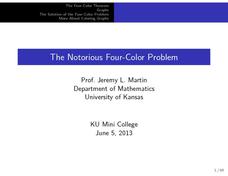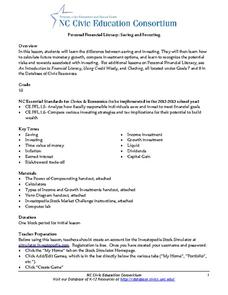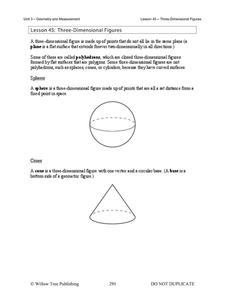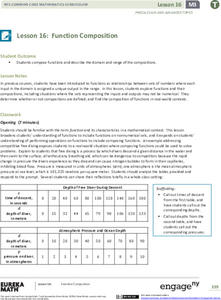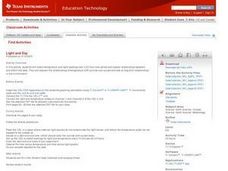Curated OER
Counting Circles
Here is another learning game that will engage your kindergartners and support them with their counting fluency. Forming a circle where everyone faces inward, choose a counting sequence (counting frontward or backward) with no more than...
Curated OER
Five by Two
Help young mathematicians read and interpret numbers from 1 to 10 and sequence them correctly with this card game. Using a deck of cards and two to three classmates, have one player hand out ten cards to each gamer and then put the extra...
Illustrative Mathematics
Running to School
The object of this activity is to compute how far Rosa ran to school. Given in the exercise is the fractional number of miles between home and school and the fractional distance Rosa ran. The commentary shows several ways to have your...
Illustrative Mathematics
Money in the Piggy Bank
It's time to crack open that piggy bank and see what's inside. First, count up the pennies, nickels, dimes, and quarters, identifying what fraction of them are dimes. Then calculate the total value of the coins, writing another fraction...
Illustrative Mathematics
Shape Hunt Part 2
Shapes are everywhere in the world around us, from rectangular doors to the circular wheels of a car. The second instructional activity in this series opens the eyes of young mathematicians to this wonderful world of shapes as they...
Exploratorium
Rotating String Shapes
Here is a very interesting way of studying triangles and polygons. Pupils work together and use pieces of string to create a variety of shapes. Depending on how many kids are manipulating the string at any one time, the number of...
Curated OER
The Notorious Four-Color Problem
Take a walk through time, 1852 to 2005, following the mathematical history, development, and solution of the Four-Color Theorem. Learners take on the role of cartographers to study a United States map that is to be...
Illustrative Mathematics
Field Day Scarcity
Introduce young mathematicians to concepts of financial literacy with this open-ended word problem. With seven dollars to spend during field day and given a list of available items and their prices, children must determine how they want...
Carolina K-12
Personal Financial Literacy: Saving and Investing
When should you save, and when should you invest? In considering this question, your class members will also learn about the time value of money, inflation, compounded interest, and income/growth investments. The resource also outlines...
West Contra Costa Unified School District
Investigating the Discriminant
When is finding the discriminant enough? Using the quadratic formula helps find solutions to quadratic equations, but there are times when just using the discriminant is appropriate. Use this algebra II lesson to help classes see...
Willow Tree
Graphing
So many methods and so little time! The efficient method of graphing a linear equation depends on what information the problem gives. Pupils learn three different methods of graphing linear equations. They graph equations using...
Willow Tree
Three-Dimensional Figures
Time to move into the third dimension! Learn the names of the geometric solids and count faces, edges, and vertices. Then learn to recognize nets that create a given solid.
West Contra Costa Unified School District
Solving Equations with Variables on Both Sides
So many different ways to solve equations, so little time! Scholars learn how to solve equations with variables on both sides by using several different methods. They apply bar models, decomposition, and traditional algebraic methods to...
Kenan Fellows
Installing and Working with R Statistical Software
Save download time—install software now in preparation for future lessons. The R statistical software is a free program used by the Federal Reserve Bank and many companies. Bring the power of the software to your classroom to use in the...
EngageNY
Function Composition
Combine functions for the first time. Pupils investigate composition of functions using a function table and then function machines in the 17th installment in a 23-part Precalculus series. Scholars learn the two notations for composition...
Curated OER
Balloons: Math with the Montgolfier Balloon
Students discover the history of hot air balloons by watching one ascent. In this physics lesson, students utilize a Montgolfier Hot Air Balloon from an earlier lesson and record the temperature, rate of ascent and the volume....
Curated OER
Tracking Fall's Falling Temperatures
Young meteorologists track weather from day to day and record results on graphs, maps, or other places. They see firsthand how weather temperatures trend cooler as fall progresses and practice grade-appropriate skills in geography (map...
Curated OER
Have You the Time of Day?
Students read a story about a day in the life of a farmer. They practice reading and writing time. They write a picture story about his or her day. They draw clock faces showing what time of day each of the events occurred.
Curated OER
Graphing Calculator Investigation - Second Degree Polynomial Functions
Young scholars solve quadratic functions. In this solving quadratic functions lesson, students determine the height of an object at a given time. Young scholars determine the time at which an object hits the ground. Students answer...
Texas Instruments
Light and Day
Pupils explore the concept of collecting data as they collect data on their graphing calculator about time, temperature, and light. Learners plot the data and create histograms and box and whisker plots to analyze the data.
Curated OER
Lesson 10 What is an Initial Public Offering (IPO)?
Students understand the difference between primary and secondary stock markets. Through the activities in this instructional activity, students predict the next best time to invest in IPOs for the Global Stock Game.
Curated OER
Weaving a Story
It's time to investigate patterns! First and second graders construct a paper weaving using a hundreds chart, then use the Ti-10 calculator to make patterns such as adding 3 each time. Learners remove multiples of three from the hundreds...
Curated OER
Can You Count on Cans?
How can a canned food drive be connected to math? It's as simple as counting and organizing the cans! Children demonstrate their ability to sort non-perishable foods into categories that include soup cans, vegetable cans, boxed items,...
Curated OER
Lesson Plan 3: Order of Operation
Order of operations is foundational for the future study of algebra. With ample time for instruction and independent practice these activities will help your class improve their understanding of this important concept. Includes the...
Other popular searches
- Time Zone Lesson Maths
- Maths Telling Time Clocks
- Time Maths
- Maths Bus/train Timetables
- Maths Time Lesson
- Maths Time Lesson Plans
- Maths Time Line








